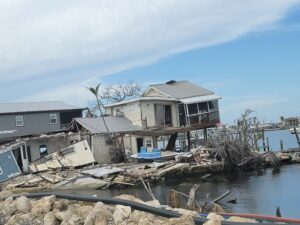Hurricane season is here, and the best way to keep your home and family safe during storms big or small is by making sure you’re prepared. Timeliness is the key — there are plenty of actions you can take today and in the coming weeks to protect your loved ones and your home from weather damage.
Ensure the best outcome with our 2019 Hurricane Season Checklist for Safety:
- Be sure you know where to get reliable information in your community. The NOAA Weather Radio is a good source.
- Know your immediate area’s hurricane response plan.
- Learn your best evacuation routes — and heed all official warnings.
- If you have a hurricane kit, make sure it’s well stocked and replace any missing items. See our Hurricane Season Kit checklist below.
- Bring in outside furniture, planters, and other outdoor items that could fly away.
- If you have hurricane windows and doors, make sure they’re closed and locked.
- If you have standard windows, protect them with plywood or hurricane shutters.
- Gather all important paperwork and documents and keep them nearby. Replacing can be difficult after a storm, and you might need items like insurance policies and identification immediately.
- Have a plan for your pet(s), and make sure they wear tags with your contact information in the event they get out — animal behavior can be unpredictable in chaotic situations.
- Be sure your local emergency shelter welcomes pets. If they don’t, find a safe place for your animal before the storm hits.
- Have a bag stocked with necessary items in case you have to evacuate quickly.
Hurricane Season Kit Checklist:
- Have some cash on hand. ATM machines aren’t always an option in an emergency.
- At least a three-day supply of food. Be sure it doesn’t need refrigeration.
- At least a three-day supply of water. Most experts advise one gallon per person per day.
- Got canned goods in your kit? Make sure you stock a can opener, too.
- Flashlight
- A hand-crank radio. If your radio takes batteries, be sure to have extra on hand.
- First-aid kit
- Insect repellent
- If you take prescription medications or require medical supplies, be sure you have enough for a full week.
- Clothes to change into and comfortable shoes
- A blanket or sleeping bag for each person
- Self-care and feminine hygiene items
- Cell phones and chargers
- A whistle to call for help
- Fire extinguisher
- Paper maps — WiFi signals could be disrupted, so don’t rely on your device’s map apps.
- Books, games, and other nonelectric items to keep children — and adults — occupied.




